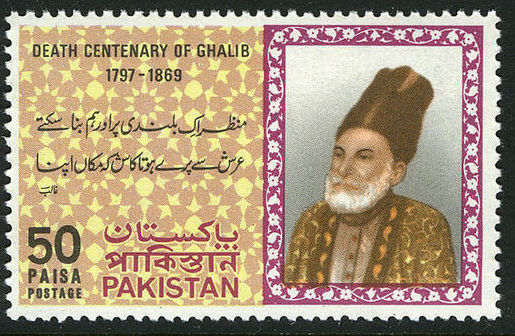FWP:
SETS == EK; HERE/THERE
GRANDIOSITY: {5,3}
SCRIPT EFFECTS: {33,7}
SKY {15,7}
As Bekhud Mohani observes, the idhar vs. udhar question is perennial. Hamid uses udhar and even argues for it in a note, and other editors seem also to be divided. As always, I follow Arshi, who goes with idhar .
But I want to disagree with Arshi's reason for doing so. He argues in his introduction (p. 158) that in Ghalib's day ūdhar was still used for udhar , and the fact that no manuscript has ūdhar makes it clear that Ghalib means not udhar but idhar . I rely on the clear fact that in Mir's poetry, which of course comes right up to Ghalib's earlier years, īdhar and ūdhar were both extremely common, and there's no particular reason to think that in Ghalib's day the spelling of one, but not the other, had differentially changed much faster. Moreover, a fine proof to the contrary is in the early {205,4}, where both forms with modern scansion (and spelling) appear in opposition to each other.
Ghalib may in fact have deliberately modernized his spelling to the undecideable contemporary form, since after all it gave him a whole new range of possibilities for multivalence. (For a similar case involving us and is , see {154,5x}.) And he certainly did modernize at times, even when no poetic advantage could be expected-- as for example from the kisū of early manuscripts to the kisī of later ones. So why would he not have gleefully pounced on the possibility of two meanings for the price of one?
Of the two possible readings, I share Arshi's preference for idhar , not on textual grounds but simply because it's so much jazzier and wilder and more un-obvious. After all, to wish for a house on the far side, on 'that' side (over toward Paradise?), so that we could have a better look at some new territory, is what anyone might do. Since when is Ghalib content to do what anyone might do?
But to wish for a house on 'this' side-- how much more irresistibly grandiose! How much more provocative and complex are the implications! That one small word shows that the speaker knows much more about the world beyond the heavens than about this world; that he now apparently lives on 'that side' rather than 'this side', so that he is somehow separated from ordinary human reality; and that the view where he is does not fully satisfy him-- he would also like a view of life on 'this side'.
The clever arrangement of the words in the first line makes it impossible to say which 'height' would be higher, this one or that one beyond the sky. In fact, it makes them look parallel and similar to each other. Each of them is a spectacle or scene in its own right, each of them is on a height. The speaker would prefer to have two of them rather than one-- simply, it seems, for the sake of novelty. Whichever one he has, he also wants the other, if only for variety. (And there seems to be no other grounds for choosing.)
It's a magnificent verse, isn't it? Witty, resonant, colloquial-feeling. It uses the technical devices of inshāʾiyah speech and orthographic multivalence not just for sophisticated amusement, but for genuine thought and perceptive observation. And with all that, it still has a wonderful flowingness, and a faux-naïf quality that makes it instantly memorizable.
On the use of apnā to mean hamārā apnā , see {15,12}.
Compare the access to 'that side' envisioned in {244x,1}. There's also Mir's similarly elegant play with us / is in M{485,3}.
Here's a Pakistani commemorative stamp, issued on Ghalib's death anniversary in 1969, that
includes this verse-- and MISQUOTES it:

By reading ʿarsh
se pare hotā , the stamp destroys all the delights of the whole idhar versus udhar question. It also uses the ordinary spelling of kāsh kih , so that the verse won't readily scan; but
that's nothing compared to the loss of the cleverly framed ambiguity that's at the heartof the verse. It's remarkable that apparently during the whole stamp-designing process no one thought it necessary to consult a divan.
Nazm:
That is, if only our house were on this side of the sky, so that we could establish a viewing-site in the sky and see our place. But the difficulty is that there is no place higher than our house itself. This is the reason that we are unaware of our true reality and essence. (40)
== Nazm page 40